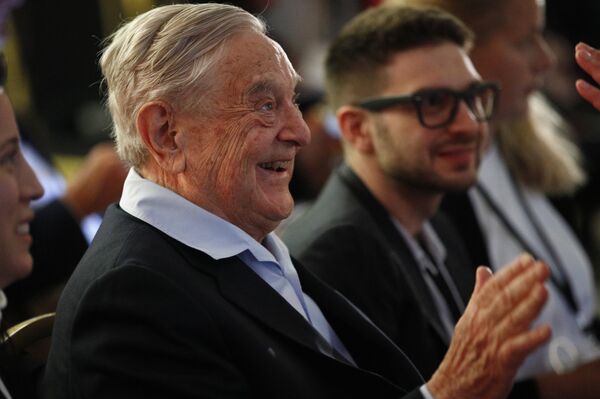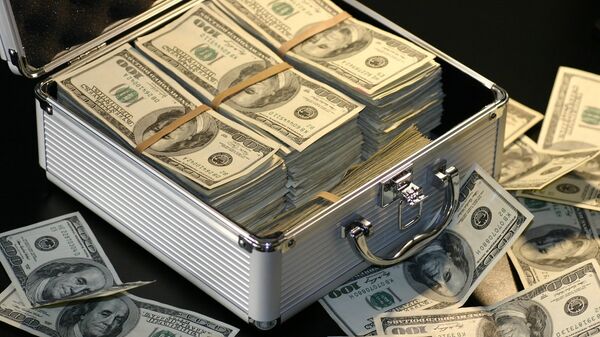"Global recession is already here", a chorus of top economic experts warned the world earlier this week, forecasting a protracted economic slowdown amid the coronavirus outbreak.
Fabien Chalandon, a French private investor, banker, and writer, deems that the global recession has yet to come, but if it comes, it will be short-lived. However, if the world's governments overreact to the COVID-19 pandemic, they will dramatically prolong and deepen it with dramatic consequences, according to the financial expert.
Sputnik: Do the world's governments have any economic instruments to mitigate the crisis? What measures should be taken to reduce the negative impact of the recession?
Fabien Chalandon: Governments have various ways to mitigate the crisis. Exceptional times require unusual measures.
The first and foremost one is to limit the duration of the confinement to essentially the time needed to identify, test, park and treat people affected by the disease.
The second one is to allocate the quarantine time of those who cannot work from home on their paid-leave rights usually drawn for holidays, at the expense of their summer holiday for this year. But this is not sufficient, as it does not immediately alleviate the cash drain for those companies and their employees.
Hence the third set of measures which is to provide through a specific central bank refinancing mechanism, bypassing banks, a direct access for companies looking for emergency financing. This is exactly what the Federal Reserve is implementing in the US with commercial paper.
The fourth is for governments to provide short term financial relief to people whose pay has been temporarily stopped, using tax money, especially for self-employed.
The fifth is to temporarily suspend, until the end of the pandemic, short selling in most markets, as it is the main driver behind the wild gyrations of share and commodity prices evidenced in the past few days. This has already been implemented in Spain and Italy.
Sputnik: Who is actually benefitting from the crisis? How could global financial speculators, including George Soros, capitalise on the global COVID-19 recession?
Fabien Chalandon: Quite obviously, the short sellers were the winners, and the wild price gyrations from one day to the next give a good sense of how massive it was. But it is a dangerous game when the volatility is so extreme, with 10% down one day and almost the same up the next, while the floor is getting close after an overall price drop of close to 30%.
The losers may be the numerous panic sellers who downloaded frantically their shares to move into cash, slowly eaten up by negative interest, and government bonds, yielding close to nothing, with the probability of rates surging up being higher than going down… and with them the risk of substantial capital losses. Private equity [is] being excluded because of its long ten-year duration, its illiquidity and often dubious returns, the only remaining asset to invest or stay invested in is shares, a reality the market will suddenly realise when the virus starts receding.
Smart investors like George Soros may have capitalised on the short-selling, but will for sure anticipate the rebound when markets turn around upwards, which they will do as violently as they went down.
But the real winner will be the cold-headed long term investor who will shrug off this market shakedown and weather this storm by avoiding any of the other alternatives chosen by the panic sellers: bonds or cash.

Sputnik: For how long will this crisis last? What changes in the global financial structure and industrial supply chains could it cause?
Fabien Chalandon: Mrs Lagarde, head of European Central Bank, stated recently that “the blow to the economy will be deep but temporary”.
It is impossible to model forward the end of this pandemic, as key unquantifiable behaviours cannot be factored, such as collective discipline versus egoistic comportments, timing of actions by health authorities, type of actions undertaken by them, such as blanket confinement versus across-the-board testing, or both sequentially, as well as level of availability of health infrastructure in relation to the number of identified cases, and the possibility of imported cases.
Extraordinary times require extraordinary action. There are no limits to our commitment to the euro. We are determined to use the full potential of our tools, within our mandate. https://t.co/RhxuVYPeVR
— Christine Lagarde (@Lagarde) March 18, 2020
What is now known comes from the Wuhan experience: the virus receded 12 days after the first very drastic blanket containment measures of mid-January; the virus has now almost disappeared after a three pronged strategy designed to thwart any overloading of the health infrastructure: a systematic containment of the entire population leading to the identification and testing of suspicious cases, followed by quarantine and well identified drug treatment of confirmed cases in makeshift hospitals, and heavy treatment of the worst cases in existing hospitals, within an overall process of two months. Chinese medical profession did a hell of a good job. China’s economy, which plummeted, has almost recuperated: as of today, key international shipping companies have recovered their pre-virus activity out of China.
In Korea, which went straight to blanket testing, the virus is also receding. The situation in Japan is under control with a very small number of cases, and no containment of whole populations or large-scale shutdowns of public places and restaurants, thanks to its signature mark of longstanding health and collective discipline. The US is following the Wuhan approach, which should lead to similar results in a similar timeframe. The issue is Europe, namely France, Italy and Spain, which apart from blanket quarantine and worse than wartime confinement, do not seem to have yet followed the subsequent Wuhan approach.
But blissful unregulated globalism is the main culprit and victim of this pandemic and reckoning time has finally arrived. The issue of underlying risks for just-in-time industrial and service supply chains has come back with a vengeance, while shortages of drugs, generics and medical equipment sourced internationally, but also massively counterfeited, a so far covered-up taboo, have created a storm of outrage. “Made Locally” is now the logo in fashion for consumers and companies alike, a revolution which was stoked by Donald Trump in the US, amid incredulity, vociferations and even hate fanned by a fossilised rear-guard of discredited Leftists.
An unexpected consequence of the virus, and a tribute to human limitless ingenuity, is this new solid-state currency for all, operated outside the control of central bankers, and kindled by a self-inflicted shortage following a hysterical home overstocking: toilet paper… Better than cash.
New currency in 2020 -toilet paper 🧻 pic.twitter.com/UejAdyz7y8
— ♞ (´・_・`) ♘ (@BABAYAGa2_0) March 21, 2020
Sputnik: What are the similarities and differences between the ongoing economic slowdown and the 2008 global financial crisis?
Fabien Chalandon: The origins of the two crises are vastly different. The 2008 blow-out came from the US market, namely excessive balance sheet leveraging by banks, and massive high-risk mortgage borrowings by insolvent consumers, and subsequently from the indiscriminate collateralisation of related loans. These were split in various abstruse tranches according to the latest pseudo-science in town, the so called “structured finance”, then peddled out to bamboozled gullible or unknowing investors and spread all around the world through arcane vehicles, by banks and insurers to the last resort defenceless investor, the retirement accounts. Deleveraging banks required a massive influx of tax money as equity. “Deleveraging” the consumer, the main driver of growth, took about ten years. But the damage to retirees still remains today, with no one answerable for this.
The 2020 potential crisis is substantially different. It is not there yet, but could come as a result of governments overreacting to the virus: excessively prolonged confinement of entire populations without testing, screening, selective confinement and treatment of identified cases can lead to the scuttling of the economy. This could be too huge a price to pay to save a limited number of elderly people weakened by serious pre-existing conditions, the main fatalities of this virus especially since this number remains – so far – still small compared to previous one-time pandemics (H1N1, SARS, Spanish Flu) and to recurring and endemic ones (pneumonia, influenza, malaria, tuberculosis, cholera, bubonic plague, smallpox, among others), all amounting to the hundreds of thousands of deaths, on which media reporting is unexplainably flimsy and inchoate, thus fanning hysteria.
LATEST: The S&P 500 falls 15% in its biggest weekly drop since October 2008. U.S. stocks fall 4.4% to their lowest in three years https://t.co/gspkN0JbCa pic.twitter.com/IQoJnzZ7A0
— Bloomberg (@business) March 20, 2020
All sectors will not be directly impacted in the same way by the stalling of the economy. The road to recession in itself is contingent upon the degree and extent of the shutdown, which varies from one country to the other depending on their respective inbred self-collective discipline to abide by cleanliness and social distancing rules: Asian countries are way ahead of Europe, with France, Italy and Spain leading the pack of the worst ones requiring the most brutal shutdowns. Companies dealing with mobility will be the most affected (tourism, airlines, taxis, etc.), then shops providing non-essential goods when ordered to close, and then most consumer-related ones. But a number of companies in the service sector, which is now the largest in developed economies, will be much less affected as they will reinvent work-from-home and teleconferencing processes to deal with employees and clients.




